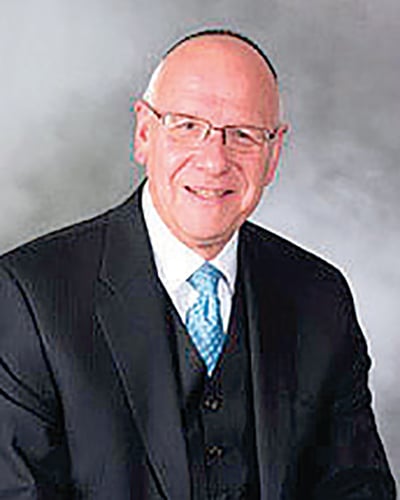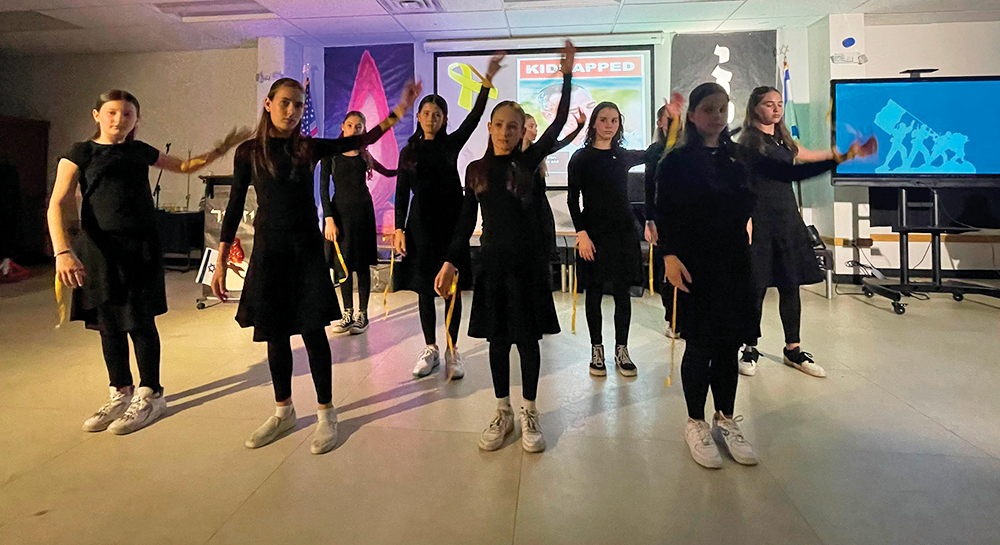

Fort Lee—“I’m not going to teach and preach about aliyah anymore. I’m actually going to do it,” said Rabbi Neil Winkler, who has been mara d’asra of Young Israel of Fort Lee and a beloved Tanach teacher at the Moriah School for almost four decades. He also is currently serving as president of the Rabbinical Council of Bergen County.
As he and Rebbetzin Andrea Winkler make plans for their departure, they described to JLBC the emotional and bittersweet feelings that are associated with leaving a community they built, while moving on to the next chapter of their lives: fulfilling a lifelong dream of living in Jerusalem.
The Winklers shared that aliyah had been on their agenda for a long time. They’ve spent a month each summer in Jerusalem for the past 19 years, and they spent a sabbatical there in 2009, where Rabbi Winkler took the opportunity to write most of his book, Bringing the Prophets to Life.
“Rabbi and Rebbetzin Winkler’s love for Israel is passionate and apparent to all,” said Rabbi Moshe Stavsky, a former student of Rabbi Winkler who now serves as rabbi at the Beis Midrash of Bergenfield. “When we lived in Fort Lee, my daughter would identify their home by the Israeli flag outside. She would say, ‘Wow! They must really love Israel.’ And how! Yet, much more than the flags and the unforgettable “Ha’am im Hagolan” banner outside their home, their speeches, shiurim, and conversations about Israel were always glowing and inspirational, communicating their strong emotional connection to the land, its people, and its destiny,” said Stavsky.
As part of his work as coordinator of Tanach studies at the Moriah School in Englewood, Rabbi Winkler described how his major goal with teaching his young students was to give them a positive experience with Tanach.
“One of my many goals was to share my passion for the beauty of our culture and our tradition. More than the text, it’s the student-teacher relationship that young people remember. Some might say it’s foolish to have that goal, but it’s important. Certainly, I want them to be serious about learning and I will make demands, but I want them to remember the class as a pleasant time of the day. I want them to have positive experiences in the classroom and remember the warmth of the relationship because I truly love these children,” he said.
Over his many years of teaching, Rabbi Winkler is proud to have taught many excellent students, some of whom have gone into the rabbinate, including several, like Stavsky, who are community rabbeim today.
“His students literally number in the thousands. I myself was fortunate to be his student there and remember his classes well, which were full of excitement, warmth, humor and his famous Rashi sheets. He made learning Torah enjoyable to us,” said Stavsky.
“I credit Rabbi Winkler for fueling my desire to compete in the Chidon HaTanach and supporting me throughout. I remember enjoying the Chidon club meetings after school, either in his classroom or in the playground, where Rabbi Winkler would both teach and quiz us,” said Stavsky.
“Over the years I’ve had an extremely close relationship with my students. I am teaching my ‘grandstudents’ now. It’s such a wonderful feeling to have people run across the street to see me; I used to run away from my teachers,” Winkler said.
“I was profoundly fortunate to have had Rabbi Winkler as a rebbe during a formative time in my Torah education,” said Rabbi Daniel Feldman, rabbi at Congregation Ohr Saadya in Teaneck. “His unique blend of humor, warmth, and broad knowledge made a tremendous impact on all of us in the class that endures as an inspiration decades later. Serving under him this year as a member of the RCBC during his presidency, brings the experience full circle and I wish him and his wonderful rebbetzin only continued success in their new chapter in Eretz Yisrael,” said Feldman.
Reminiscing about Rabbi Winkler as a former paddleball partner as well as a fellow RCBC rabbi, Rabbi Yosef Adler said of his friend: “He is fiercely devoted to Medinat Yisrael, having spent the last 15 summers in Israel, and is a rav whose decisions and leadership reflect his sensitivity for the broader Jewish community,” Adler said.
Rabbi Benjamin Yudin also said that Rabbi and Rebbetzin Winkler are two of his and his wife’s closest friends. “There is no generation gap between himself and his students. They adore him because of his sense of humor, his sincerity. He is genuine. This is how he presents himself in everything. He has taught about the importance of the land of Israel. It is an integral part of who he is. This is a life’s dream being fulfilled, and these are two very special people who we will miss very much,” said Yudin.
Rabbi and Rebbetzin Winkler are thoroughly beloved and respected by the entire Fort Lee community, which has grown from 20 families in 1978 when they arrived, to a thriving community today with three Orthodox synagogues, an eruv and a mikvah.
The rabbi, who currently serves as president of the RCBC for the second time, has been involved in the organization since its inception. He described its growth over the years: “We started it with four or five rabbis, Rabbis Swift, Gordon, Yudin, Adler, and Fass, and only one store under supervision. Now, we have about 25 rabbis and some 60-65 caterers, stores, and restaurants under supervision.”
Winkler stressed that the job of a community rabbi, especially when there is a kashrus-certifying organization involved, requires an investment of much time and energy. “What many people fail to understand is that this is all done voluntarily. The community rabbis are not paid for their work with the RCBC. We do this for the community,” he said.
The Winklers are not only leaving the community, but also their children and grandchildren, all of whom live nearby. Both Rabbi and Rebbetzin Winkler discussed the difficulty of leaving all of their children and grandchildren here in America. “We are trying not to think about what we are leaving, but what we are going to,” Winkler said.
“My wife and I have been dreaming of aliyah for many years. It has been on the agenda. We didn’t do it earlier, when my children were at crucial phases of their lives. But the idea of aliyah was always very clear. We have very strong feelings about the state of Israel. It was a dream we hoped would come soon,” he said.
Rebbetzin Winkler also has strong feelings about leaving an organization she helped found: Project S.A.R.A.H, an organization that fights domestic violence in the observant community. “The Project S.A.R.A.H. work is important to me. It will be very difficult to leave that. I hope to be able to continue involvement with that on some level even though I won’t be able to attend monthly meetings anymore,” she said.
She also has worked at Ma’ayanot High School for Girls as an administrative assistant, since before its official founding in 1995.
In addition to a full time day job and a full time volunteer job, Rebbetzin Winkler also shared how much time she and her husband spent working to build the Fort Lee community.
Rebbetzin Winkler explained that she established the synagogue’s sisterhood and that many of its projects were developed under her leadership. Bikur cholim, comforting mourners, programming, holiday kiddushes, and special fund-raising events such as the Purim project, are only some of her many contributions over the years. “I also created the women’s Tehillim group in Fort Lee which met for many years,” she said.
Furthermore, as Rabbi and Rebbitzin, their house has always been open, ready to host people for Shabbos lunch and Yom Tov meals. “We did everything as a team here to make the community grow and to make it the wonderful place to live in that it is today,” Rebbetzin Winkler said.
While it is difficult to leave a community where she is so integral, “This is the right time for us to fulfill our lifelong dream and be able to live in Jerusalem—when we can enjoy it, when we can give a little of ourselves to Jerusalem and enjoy what Jerusalem has to offer us,” Rebbetzin Winkler said. “We had a wonderful taste of it when we were there on sabbatical,” she said.
During their sabbatical in 2009, Rebbetzin Winkler volunteered in the Emunah College preparing young women for high school equivalency exams, something she hopes to do again. Rabbi Winkler, who was busy writing his book and teaching during that sabbatical, will be lecturing and developing curriculum in the field of prophets, building on the work he presented in his book, he said.
The Young Israel of Fort Lee is hosting a dinner in honor of the Winklers on June 22. For more information, please visit http://www.yiftlee.org/.
By Elizabeth Kratz













